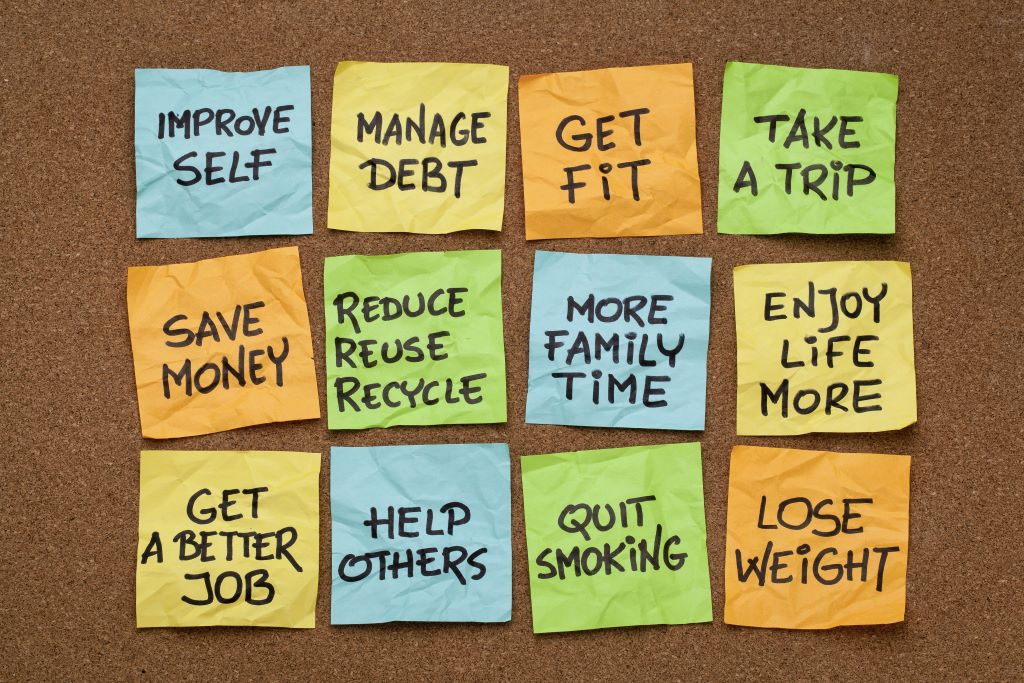
With New Year’s Day right around the corner, your mind is probably racing! How did 2023 fly by so quickly?! Yet, as we approach 2024 at lightning speed, it’s time for a change, reflection, and time to set resolutions. Every year, millions of people resolve to improve their lives in some way or another, but how many of those people actually stick to their resolutions? If you’re struggling to set or keep your New Year’s resolutions, don’t worry—you’re not alone. Studies show that only 8 percent of people who set New Year’s resolutions achieve them.* However, there are ways that you can increase your chances of success. By setting realistic goals and making small changes, you can make 2024 the year you finally achieve your long-term goals. Keep reading to find out how.
What is a New Year’s Resolution?
A New Year’s resolution is a tradition where people set specific goals or intentions for self-improvement, positive change, or personal development at the beginning of a new year. These resolutions are typically aimed at areas of one’s life that they wish to enhance or modify, such as health, relationships, career, finances, or personal habits.
Common examples of New Year’s resolutions include commitments to exercise more, eat healthier, quit smoking, save money, learn a new skill, travel more, or spend more quality time with loved ones. The start of a new year is often seen as an opportunity for a fresh start, and setting resolutions can provide a structured way to work towards achieving one’s desired changes or improvements.
While New Year’s resolutions can be highly motivating, it’s important to approach them with realistic expectations and a sustainable plan. Success often comes from setting specific, achievable goals and having a clear strategy in place. Additionally, being adaptable and willing to adjust your approach as needed can help increase the chances of sticking to your resolutions throughout the year.
Choosing Reasonable New Year’s Resolutions
Pick An Achievable Goal
The first step to successful goal setting is picking the right goal. Too often, people set lofty goals that are impossible to achieve. For example, if you’ve never exercised in your life, resolving to work out for two hours every day is probably not going to work out (pun intended). Likewise, crash dieting is not the answer if you’re trying to lose weight.
Instead of setting unreachable goals, pick something realistic and achievable. If you want to get in shape, start by resolving to walk for 30 minutes three times a week. Commit to eating healthy meals and snacks and cutting back on processed foods to lose weight. By setting realistic goals, you’ll increase your chances of success.
Prioritize The Right Objectives
While setting achievable goals is essential, it’s also important to prioritize the right ones. In other words, don’t try to take on too many things at once. Trying to accomplish too many things can be overwhelming and lead to failure.
Instead of trying to do everything at once, focus on one or two goals that are most important to you. For example, if your family is your top priority, your goal might be to put down your phone and spend more time with them. Try limiting your screen time by 15 minutes each week.
If your career is your primary focus, your goal might be to get a promotion or change jobs. Once you’ve achieved those goals, you can start working on other things. However, it’s important not to take on too much at once.

How to Make Sure You Stick to Your New Year’s Resolutions
Make Small Changes
Another way to increase your chances of success is by making small changes instead of drastic ones. Remember, lifestyle changes are a marathon, not a sprint. You didn’t gain weight overnight, and you’re not going to lose it overnight. However, making small changes will help you stay on track and avoid feeling overwhelmed by your goals.
For example, if your goal is to eat healthier meals, start by adding one more vegetable or fruit daily. If your goal is to start a new business, start by taking one small step each day. You’ll be more likely to stick to your goals in the long run by making small changes.
Track Your Progress
Achieving long-term goals can be daunting—but it’s important to remember that even small progress is progress. So make sure to track your progress along the way! This will help you stay motivated and on track toward achieving your goals. There are several different ways that you can track your progress.
If you’re trying to lose weight, keep a food journal or log your daily calorie intake. If you’re trying to get in shape, track the number of steps you take each day or the distance you walk or run each week. Seeing yourself making progress will help keep you motivated when times get tough. Don’t forget to manage expectations. If you expect to see instant results, you will be disappointed.
Set Up an Accountability System
Sometimes, tracking your progress isn’t enough. If you’re struggling to stay on track, you might need a little extra help. That’s where an accountability system comes in. An accountability system is simply a way of holding yourself accountable for your goals.
There are a number of different ways that you can set up an accountability system. For example, you might ask a friend or family member to check in on you periodically, or you might join a support group or online community. Whatever you decide, make sure that it’s something that will work for you.
Take Control of Your Finances
This is a big one because if you are stressed about finances, the rest of our goals tend to fall by the wayside. So take some time at the end of 2023 to really look at your income, spending habits, and goals. Do you have some debt you want to tackle? Do you have a dream vacation you want to take the family on in 2024? These are all questions you need to ask yourself to set some financial goals.
Don’t Be Too Hard on Yourself with Your New Year’s Resolutions
Last but not least, it’s important to remember that setbacks are expected—and that you shouldn’t be too hard on yourself if you have one. If you slip up or make a mistake, don’t give up on your goals. Just get back on track and keep going.
You might also want to consider giving yourself some grace period. For example, if your goal is to eat healthier meals, you might allow yourself to indulge in an unhealthy meal once in a while. Or if your goal is to exercise more, you might let yourself take a day off from time to time. Just make sure that you’re not using these grace periods as an excuse to give up on your goals altogether.
High-interest loans can be expensive and should be used only for short-term financial needs, not long-term solutions. Customers with credit difficulties should seek credit counseling. The opinions expressed above are solely the author’s views and may or may not reflect the opinions and beliefs of the website or its affiliates. Cash Factory USA does not provide financial advice.
* This blog contains links to other third-party website that is not endorsed by, directly affiliated with, or sponsored by Cash Factory USA. Such links are only for the convenience of the reader, user, or browser.